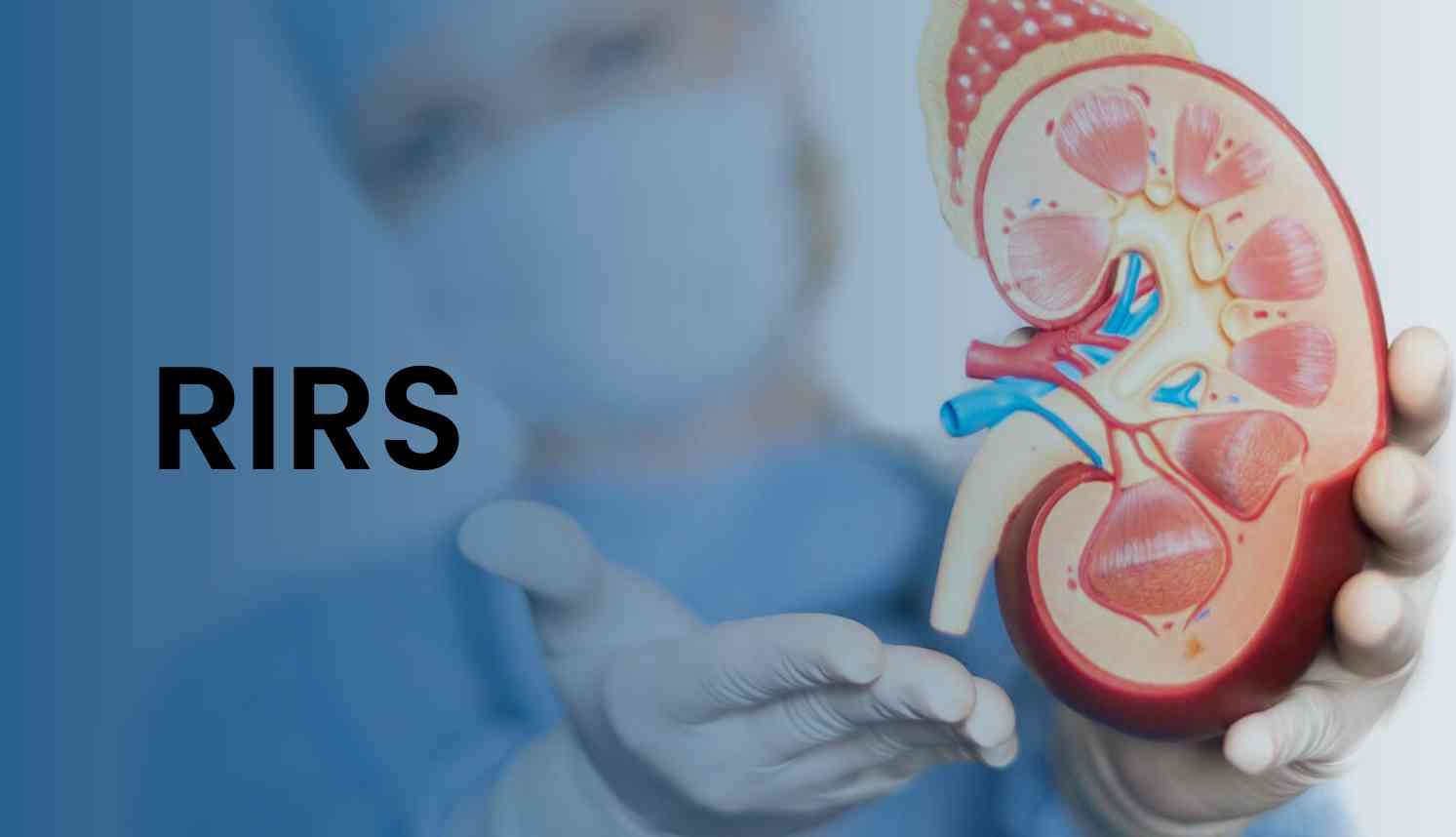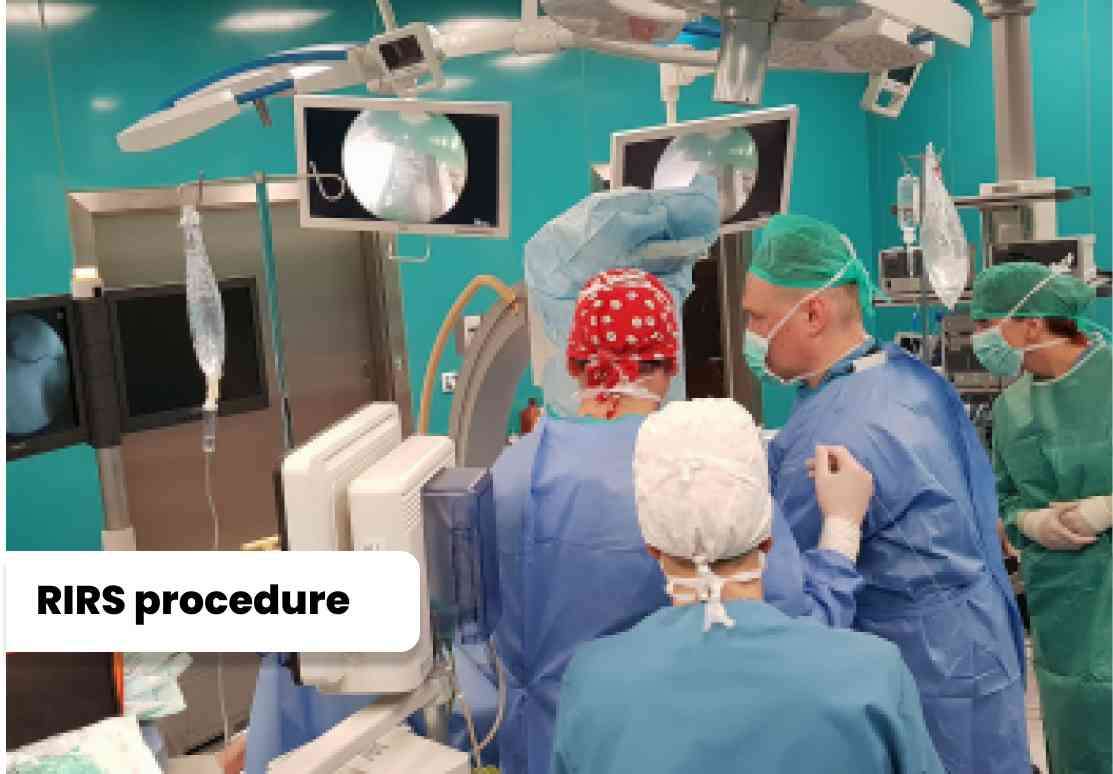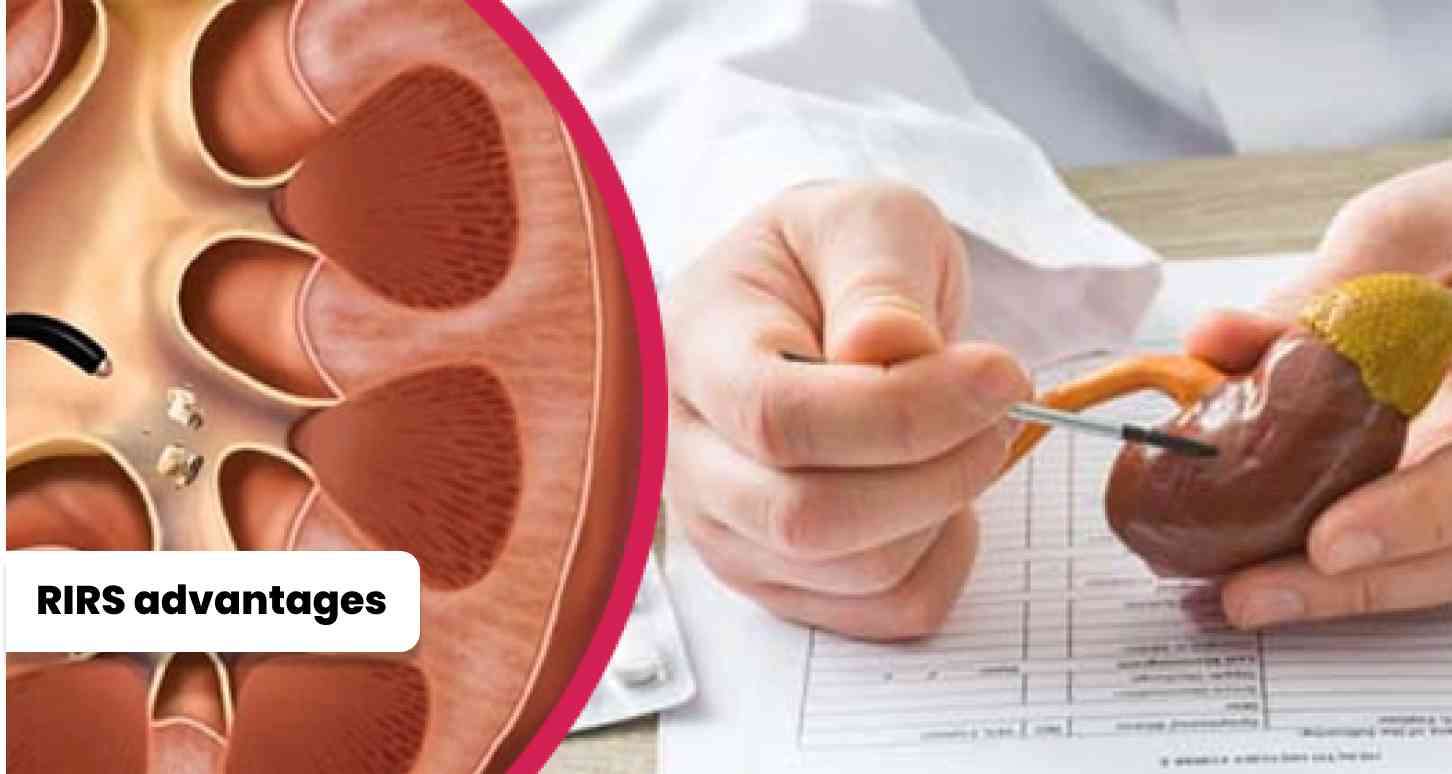Retrograde intrarenal surgery (RIRS) is a minimally invasive surgical procedure used to treat kidney stones. It involves accessing and treating stones located within the kidney using a flexible ureteroscope. Call us to book an appointment with the best Urology specialist near you.
RIRS, also known as Retrograde Intrarenal
Surgery, is a state-of-the-art procedure designed to remove kidney stones using
a flexible ureteroscope. Unlike traditional open surgeries, RIRS does not
require any incisions or invasive techniques. Instead, it utilizes the body's
natural pathways to access and remove kidney stones, resulting in reduced pain,
faster recovery, and minimal scarring.

RIRS, also known as Retrograde Intrarenal
Surgery, is a state-of-the-art procedure designed to remove kidney stones using
a flexible ureteroscope. Unlike traditional open surgeries, RIRS does not
require any incisions or invasive techniques. Instead, it utilizes the body's
natural pathways to access and remove kidney stones, resulting in reduced pain,
faster recovery, and minimal scarring.

One of the significant advantages of RIRS is its effectiveness in treating complex kidney stones. Traditional procedures might struggle to address larger stones or those situated in hard-to-reach areas. However, RIRS allows surgeons to access even the most challenging stones with precision, reducing the need for more invasive interventions. Furthermore, RIRS boasts several benefits over other treatment options. The minimally invasive nature of the procedure means that patients typically experience less pain and discomfort during the recovery process. It also leads to shorter hospital stays, allowing individuals to return to their daily routines more swiftly. It is important to note that the full form of "RIRS" stands for "Retrograde Intrarenal Surgery." The term retrograde refers to the backward flow, while intrarenal signifies that the procedure is performed within the kidney itself. By combining these elements, RIRS accurately describes the technique used to access and treat kidney stones.

One of the significant advantages of RIRS is its effectiveness in treating complex kidney stones. Traditional procedures might struggle to address larger stones or those situated in hard-to-reach areas. However, RIRS allows surgeons to access even the most challenging stones with precision, reducing the need for more invasive interventions.
Furthermore, RIRS boasts several benefits over other treatment options. The minimally invasive nature of the procedure means that patients typically experience less pain and discomfort during the recovery process. It also leads to shorter hospital stays, allowing individuals to return to their daily routines more swiftly.
It is important to note that the full form of "RIRS" stands for "Retrograde Intrarenal Surgery." The term retrograde refers to the backward flow, while intrarenal signifies that the procedure is performed within the kidney itself. By combining these elements, RIRS accurately describes the technique used to access and treat kidney stones.
When it comes to the cost of RIRS surgery, several factors come into play. The overall expenses may vary depending on the healthcare facility, geographic location, the complexity of the case, and the expertise of the medical professionals involved. Generally, RIRS can be more expensive compared to certain non-surgical treatments or procedures such as extracorporeal shock wave lithotripsy (ESWL). However, considering the benefits it offers, many patients find it to be a worthwhile investment in their health and quality of life.
|
Serial No |
City |
Minimum Cost (INR) |
Average Cost (INR) |
|
1 |
Mumbai |
60,000 |
1,50,000 |
|
2 |
Delhi |
50,000 |
1,30,000 |
|
3 |
Bangalore |
45,000 |
1,20,000 |
|
4 |
Chennai |
40,000 |
1,00,000 |
|
5 |
Kolkata |
40,000 |
95,000 |
|
6 |
Hyderabad |
35,000 |
90,000 |
|
7 |
Pune |
35,000 |
85,000 |
|
8 |
Ahmedabad |
30,000 |
75,000 |
|
9 |
Jaipur |
25,000 |
65,000 |
|
10 |
Chandigarh |
25,000 |
60,000 |
|
11 |
Lucknow |
22,000 |
55,000 |
|
12 |
Indore |
20,000 |
50,000 |
|
13 |
Kochi |
20,000 |
50,000 |
|
14 |
Coimbatore |
18,000 |
45,000 |
|
15 |
Bhopal |
16,000 |
40,000 |
|
16 |
Nagpur |
15,000 |
38,000 |
|
17 |
Goa |
15,000 |
35,000 |
|
18 |
Mangalore |
14,000 |
35,000 |
|
19 |
Trivandrum |
12,000 |
30,000 |
|
20 |
Guwahati |
10,000 |
25,000 |
|
Serial No |
Hospital Name |
Address |
Contact Number |
|
1 |
All India Institute of Medical Sciences (AIIMS) |
Ansari Nagar, Aurobindo Marg, New Delhi - 110029 |
+91-11-26588500 |
|
2 |
Post Graduate Institute of Medical Education and Research (PGIMER) |
Sector-12, Chandigarh - 160012 |
+91-172-2747585 |
|
3 |
Sanjay Gandhi Postgraduate Institute of Medical Sciences (SGPGIMS) |
Rae Bareli Road, Lucknow, Uttar Pradesh - 226014 |
+91-522-2668700 |
|
4 |
JIPMER (Jawaharlal Institute of Postgraduate Medical Education and Research) |
Dhanvantari Nagar, Puducherry - 605006 |
+91-413-2296000 |
|
5 |
Sree Chitra Tirunal Institute for Medical Sciences and Technology (SCTIMST) |
Medical College P.O., Thiruvananthapuram, Kerala - 695011 |
+91-471-2524266 |
|
6 |
King George's Medical University (KGMU) |
Chowk, Lucknow, Uttar Pradesh - 226003 |
+91-522-2257450 |
|
7 |
Nizam's Institute of Medical Sciences (NIMS) |
Punjagutta, Hyderabad, Telangana - 500082 |
+91-40-23489000 |
|
8 |
Government Medical College and Hospital (GMCH) |
Sector 32, Chandigarh - 160030 |
+91-172-2601023 |
|
9 |
Institute of Medical Sciences (IMS), Banaras Hindu University (BHU) |
Lanka, Varanasi, Uttar Pradesh - 221005 |
+91-542-2367568 |
|
10 |
Osmania General Hospital |
Afzal Gunj, Hyderabad, Telangana - 500012 |
+91-40-24600146 |
Please Wait..